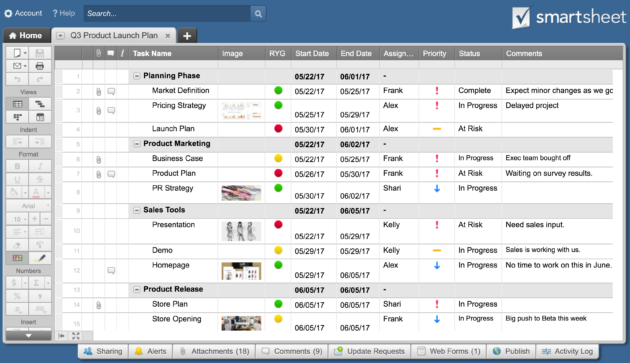
Project and work management technology company Smartsheet has landed the biggest funding round in the company’s 11-year history — $52 million — as it expands globally and delves further into automating recurring business tasks.
The Series F round is led by existing investor Insight Venture Partners, with participation from previous investors Madrona Venture Group and Sutter Hill Ventures, and new investor, Summit Partners. It brings Smartsheet to more than $120 million in total funding. The round gives the company a post-funding valuation of $852 million, on a possible path to billion-dollar “unicorn” status.
In an interview with GeekWire, Smartsheet CEO Mark Mader said the company is on pace to hit $100 million in annual recurring revenue this quarter, and it has only spent a total of about $50 million to get there. Smartsheet reported subscription revenue of more than $70 million in 2016; that number has grown at least 60 percent year-over-year for the past five years.
Smartsheet’s emphasis has expanded beyond project management, into other enterprise collaboration tools, and a big push right now centers on automation. For example, if a company has to do the same work at the same time every year, for an annual event or another regular activity, Smartsheet wants to be able to complete recurring tasks, rather than just supplying a platform for people to get those things done.
Project management is a competitive industry, with heavyweights like Trello and many others offering cloud-based apps to help people work. Smartsheet’s biggest competition, according to Mader, is not another project management company, but “the incumbency of bad habits,” of organizations that overuse email and spreadsheets when a collaborative tool would make more sense.

Smartsheet boasts a customer base of more than 69,000 companies in 190 countries, including Netflix, NBC Universal, Sony Music, Comcast, Hilton and Weyerhaeuser. These companies use a variety of collaboration tools, and Smartsheet isn’t trying to fill the role of be-all-end-all for collaboration. Instead, it wants to build bridges to other collaborative services — from file sharing to document creation to chat apps like Microsoft Teams and Slack.
“Each of the leaders in these categories are figuring out not just how to own that space, but also how do you add value to the neighboring properties, and that is something we are working very hard on,” Mader said.
Customization is also a big point of emphasis for Smartsheet. Mader listed a few examples: providing capabilities for store owners to manage renovation projects; creating a platform for consulting companies to onboard new clients; and supporting behind-the-scenes planning for events as a large as the Super Bowl.
Last year, Smartsheet introduced a visual organization system called Card View in June and a dashboard-like system called Sights in March. It also hired its first CFO in September, bringing in Jenny Ceran, a veteran of Silicon Valley heavyweights like eBay, Cisco and Box, to manage the company’s finance, legal and IT departments.
With these new capabilities comes a growing headcount. Smartsheet right now employs a little under 600 people. Mader told GeekWire at the beginning of 2017 that the company planned to open a Boston office this year and grow its global headcount to about 750.

About 475 people work out of Smartsheet’s Bellevue, Wash. headquarters, with another 35 in Boston. The company also has field offices in several major cities, such as New York, San Francisco and Chicago.
The company’s next major office expansion will likely come abroad, to match up with Smartsheet’s global customer base. Mader said about 35 percent of revenue comes from customers outside the U.S.
Smartsheet also has its eye on global expansion of its storage capabilities. Right now, Smartsheet employs a hybrid approach, using Amazon Web Services and co-location service Equinix. Internationally, Smartsheet is looking at all the big public cloud providers: AWS, Microsoft Azure and Google Cloud.
All this growth and change is leading Smartsheet into new areas, both geographically and in focus. But expansion and new funding aren’t going to fundamentally change how the company operates, Mader said.
“This is a very important, significant milestone for us, but capital in its own right doesn’t do anything for the business,” Mader said. “You’ve got to exercise it. And we are staying true to what we started 10 years ago. We’ve expanded in our thinking, and the clients we are serving have expanded, but it’s a continuation of what we are doing, and it’s pretty exciting.”





